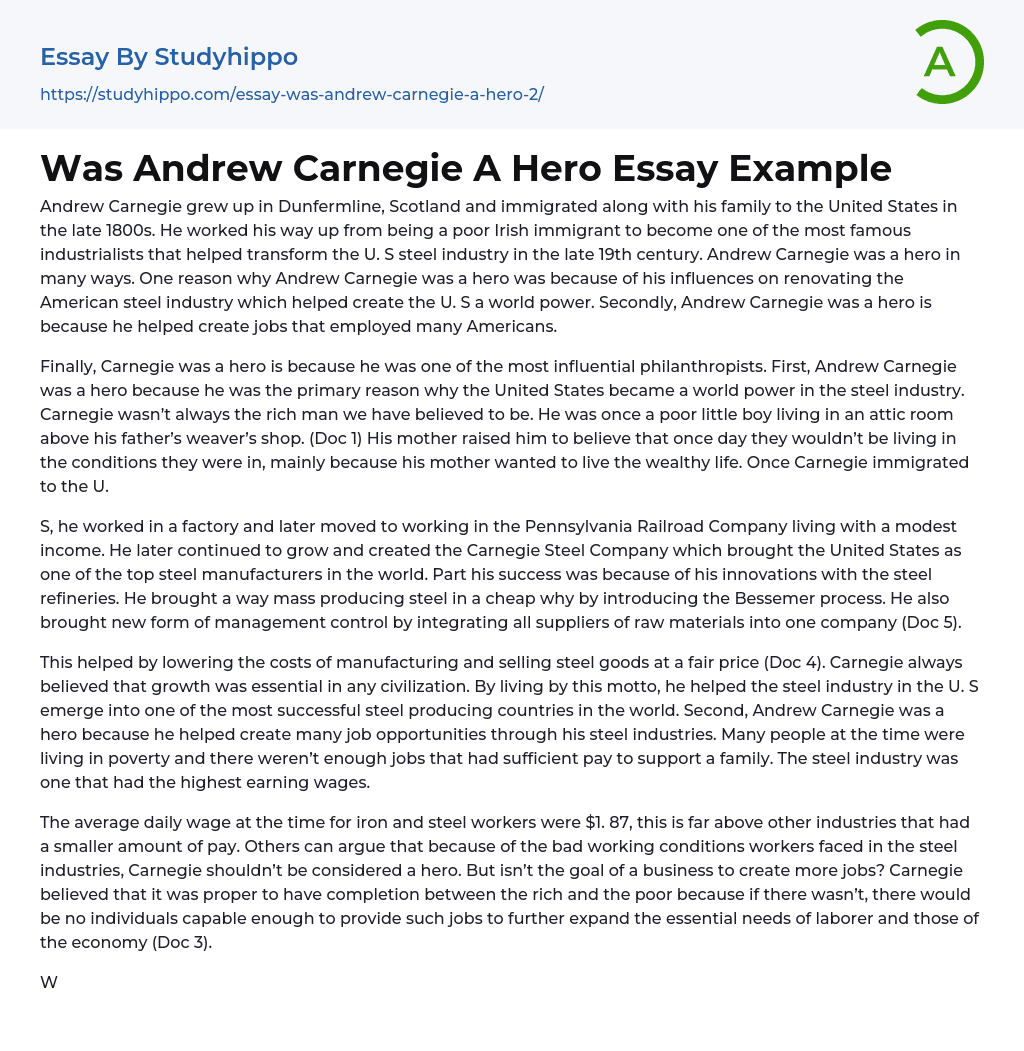Andrew Carnegie, born in Dunfermline, Scotland, immigrated to the United States with his family in the late 1800s. Despite starting as a impoverished Irish immigrant, he became renowned for transforming the U.S. steel industry in the late 19th century. Through his innovations, American steel was modernized and the nation's global position improved. Additionally, Carnegie should be acknowledged for creating job prospects for countless Americans.
Andrew Carnegie, who is highly respected for his philanthropy and significant impact on the steel industry that played a role in elevating the United States to a prominent position, began his journey from modest origins as a young boy residing in an attic room above his father's weaver's shop. Despite his present wealth and accomplishments, it is often overlooked that Carnegie started with humble beginnings, guided by his mother's belief that
...they would overcome poverty and attain prosperity. After immigrating to the U.
Initially, Mr. S started his career in a factory but later found work at the Pennsylvania Railroad Company, where he earned a modest income. Eventually, he established the Carnegie Steel Company, which played a critical role in making the United States one of the top steel manufacturers globally. One key factor that contributed to his success was his innovative techniques for refining steel. He introduced the Bessemer process, an efficient and cost-effective method for large-scale steel production. Furthermore, he revolutionized management control by merging all suppliers of raw materials into one company (Doc 5).
Carnegie played a significant role in reducing the expenses of manufacturing and selling steel products at a reasonable price (Doc 4), which facilitated the expansion of the steel sector
in the United States, making it one of the most prosperous steel-producing nations. Additionally, his establishment of steel industries generated numerous job prospects that were particularly advantageous for individuals experiencing poverty and lacking adequate employment options. It is worth noting that the steel industry offered exceptionally high wages.
At the time, iron and steel workers were paid an average daily wage of $1.87, significantly higher than workers in other industries. Despite criticism for poor working conditions in steel industries, some argue that Carnegie shouldn't be vilified as he aimed to create job opportunities. Carnegie believed competition between the wealthy and impoverished was important as it led to job creation, meeting essential needs of laborers, and boosting the economy (Doc 3).
J. P. Morgan purchased Carnegie Steel for $400 Million, resulting in the company being renamed U. S Steel and creating numerous job opportunities with a workforce of 168,000 people. Despite his wealth, Andrew Carnegie believed in giving back to society through philanthropy and donations as he saw it as the most beneficial way to use his fortune for the community (Doc 8). This provided them with opportunities they couldn't create themselves. Therefore, Carnegie should be recognized as a hero who dedicated his life to accumulating great wealth and becoming one of the wealthiest individuals of the 19th century.
After his retirement, Andrew Carnegie recognized the significance of utilizing his wealth effectively. He dedicated himself to philanthropic endeavors which encompassed financing public education, offering assistance to steel workers and their families, as well as establishing public libraries. As per Doc 9, Carnegie's overall contribution amounted to $350,695,653. Before passing away in 1919, he
established The Carnegie Corporation with the objective of carrying forward his charitable initiatives. Numerous institutions such as schools, libraries, and foundations owe their existence to the benevolence of Carnegie. Clearly, Carnegie was not an ordinary businessman.
Andrew Carnegie, a well-known industrialist and influential philanthropist, was committed to serving the American people. His steel business not only played a significant role in the United States but also earned him recognition as a hero. In challenging times, he provided employment opportunities that guaranteed job security for many individuals. Additionally, Carnegie's philanthropic efforts included establishing funds for schools, libraries, and other public institutions.
- Factory essays
- Material essays
- Production And Manufacturing essays
- Alarm clock essays
- Overpopulation essays
- Homelessness essays
- Hunger essays
- Dumpster Diving essays
- Homelessness In America essays
- Accounting essays
- Andrew Carnegie essays
- Automation essays
- Business Cycle essays
- Business Intelligence essays
- Business Model essays
- Business Operations essays
- Business Software essays
- Cooperation essays
- Cooperative essays
- Corporate Social Responsibility essays
- Corporation essays
- Customer Relationship Management essays
- Family Business essays
- Franchising essays
- Harvard Business School essays
- Harvard university essays
- Human Resource Management essays
- Infrastructure essays
- Inventory essays
- Logistics essays
- Management essays
- Manufacturing essays
- Market essays
- Marketing essays
- Multinational Corporation essays
- News Media essays
- Online Shopping essays
- Quality Assurance essays
- Richard Branson essays
- Sales essays
- Selling essays
- Shopping Mall essays
- Small Business essays
- Starting a Business essays
- Stock essays
- Strategy essays
- Structure essays
- Trade Union essays
- Waste essays
- Abortion essays




